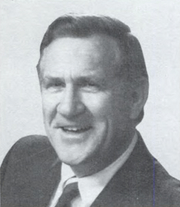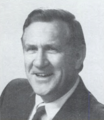William E. Dannemeyer facts for kids
Quick facts for kids
William E. Dannemeyer
|
|
|---|---|
 |
|
| Member of the U.S. House of Representatives from California's 39th district |
|
| In office January 3, 1979 – January 3, 1993 |
|
| Preceded by | Charles E. Wiggins |
| Succeeded by | Ed Royce |
| Member of the California State Assembly from the 69th district |
|
| In office January 7, 1963 – January 2, 1967 |
|
| Preceded by | Carley V. Porter |
| Succeeded by | Kenneth Cory |
| In office December 6, 1976 – November 30, 1978 |
|
| Preceded by | John Briggs |
| Succeeded by | Ross Johnson |
| Personal details | |
| Born |
William Edwin Dannemeyer
September 22, 1929 Long Beach, California |
| Died | July 9, 2019 (aged 89) Thousand Palms, California |
| Political party | Democratic (before 1968) Republican (1968–2019) |
| Spouses |
|
| Children | 3 |
| Military service | |
| Branch/service | |
| Battles/wars | Korean War |
William Edwin Dannemeyer (born September 22, 1929 – died July 9, 2019) was an American politician, activist, and author. He was known for his strong conservative views. He served as a U.S. Representative for California's 39th Congressional District from 1979 to 1993. During his time in Congress, he became a well-known voice for conservative ideas in Orange County.
Later in his life, Mr. Dannemeyer expressed some very strong and controversial opinions. His son, Bruce, stated that these views were influenced by his father's second wife, Lorraine Day. Bruce also said that his father's opinions on social issues came from his religious background.
Contents
Early Life and Education
William Dannemeyer was born in Long Beach, California. His parents were German immigrants. He went to Trinity Lutheran School and Long Beach Poly High School.
He was an Eagle Scout, which is the highest rank in the Boy Scouts of America. He also received the Distinguished Eagle Scout Award. After high school, he attended Santa Maria Junior College in 1947. He then transferred to Valparaiso University in Indiana, graduating in 1950.
Mr. Dannemeyer earned a law degree (called a J.D.) from Hastings College of the Law in 1952. From 1952 to 1954, he served in the United States Army during the Korean War. He was part of the Counter Intelligence Corps.
Starting His Career in Law and Politics
After serving in the Army, Dannemeyer began working as a lawyer in Santa Barbara in 1955. At the same time, he worked as a deputy district attorney for Santa Barbara County.
In 1959, he moved to Fullerton and became the assistant city attorney. He first entered politics as a Democrat. He was elected to the California State Assembly in 1962 and again in 1964. In 1964, he was also part of the Electoral College, voting for Lyndon Johnson for president.
In 1966, he tried to win a seat in the California State Senate but was not successful. From 1966 to 1976, he worked as a judge for municipal and superior courts. In 1968, he announced on a TV show that he was leaving the Democratic Party to become a Republican. He was elected to the Assembly one last time in 1976 as a Republican.
Serving in Congress
In November 1978, William Dannemeyer was elected to the United States House of Representatives as a Republican. He served for six more terms after that. He became known for his strong conservative views on important committees, including the Budget, Judiciary, and Energy and Commerce Committees.
He supported laws that aimed to control illegal immigration and make flag desecration a crime. In 1982, he tried to stop federal money from being used for exhibits about evolution at the Smithsonian Institution. He also wanted to ease the rules about the separation of church and state.
When it came to money matters, he supported cutting government spending for social programs. He also pushed for renegotiating the national debt, lowering taxes, and reducing government rules for businesses. In 1985, he was a key supporter of a law that removed rules on natural gas prices.
In 1989, he helped lead the impeachment trial of Judge Walter Nixon for lying under oath. In 1990, he was one of only twenty representatives who voted against the Americans with Disabilities Act.
Mr. Dannemeyer was a strong critic of certain social issues. He published a book in 1989 called Shadow in the Land: Homosexuality in America.
In 1992, Dannemeyer decided not to run for re-election to the House of Representatives. Instead, he ran for the Republican nomination for U.S. Senator, but he lost that election.
After Congress
In 1994, Mr. Dannemeyer ran for U.S. Senator again but was not successful. After leaving public office, he continued to share his strong opinions about politics.
William Dannemeyer was the honorary national chairman of a group called Citizens For a Better America.
Personal Life
William Dannemeyer married Evelyn in August 1955. They had three children together. Evelyn passed away from cancer in 1999. Mr. Dannemeyer later married Lorraine Day in 2004.
William Dannemeyer died on July 9, 2019, at the age of 89 in Thousand Palms, California. He had been living with dementia in his later years.
Images for kids


